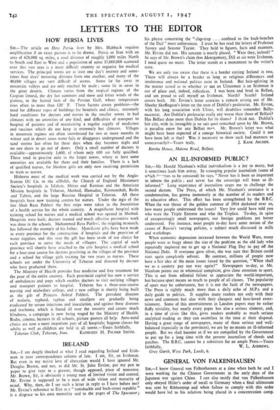LETTERS TO THE EDITOR
HOW PERSIA LIVES
SIR,—The article on How Persia lives by Mrs. Hubback requires amplification if an exact picture is to be drawn. Persia or Iran with an area of 628,000 sq. miles, a road distance of roughly 1,000 miles North to South and East to West and a population of some 15,000,000 scattered over this vast area is a most difficult country to organise for medical services. The principal towns are at least one day's journey and some- times four days' motoring distance from one another, and many of the 40,000 villages are very difficult of access. Some lie far away in mountain valleys and are only reached by mule ; some lie in oases in the great deserts. Climate varies from the tropical regions of the Caspian littoral, the dry hot summers and snow and bitter winds of the plateau, to the humid heat of the Persian Gulf, where temperature rises often to more than 120' F. These factors create problems—the need for different types of buildings for hospitals and clinics, extremely hard conditions for doctors and nurses in the smaller towns in bad climates with no amenities of any kind, and difficulties of transport to hospital of patients and of maintaining a regular supply of medicines and vaccines which do not keep in extremely hot climates. Villages in mountain regions are often snowbound for two or more months in winter and in desert areas water fails or disappears underground and the sand storms last often for three days when day becomes night and no one dares to go out of doors. Only a small number of doctors is available—approximately 1,600, of whom only 600 are fully qualified. These tend to practise only in the larger towns, where at least some amenities are available for them and their families. There is a lack of qualified nurses, for Moslem girls are only now receiving permission to train as nurses.
Hitherto most of the medical work was carried out by the Anglo- Iranian Oil Co. in the oilfields, the Church of England Missionary Society's hospitals in Isfahan, Shiraz and Kerman and the American Mission hospitals in Teheran, Meshed, Hamadan, Kermanshah, Resht and Tabriz, and the large Russian Hospital in Teheran. All these hospitals have now training centres for nurses. Under the ngis of the late Shah Reza Pahlevi the first steps were taken in the foundation of a health service for the whole country. A magnificent hospital with training school for nurses and a medical school was opened in Meshed. Hospitals were built, doctors trained and much effective preventive work was done in the schools. Mohammed Reza Pahlevi, the reigning monarch, has followed the example of his father. Munificent gifts have been made to every province for the construction of hospitals and the provislon of water supplies, and this year the gift has been made of ten clinics for each province to _serve the needs of villagers The capital of each province will shortly have attached to the city hospital a medical school for a four-year course for doctors practising in the villages of the province and a school for village girls training for two years as nurses. These schools are under the University of Teheran and directed by doctors who have graduated there.
The Ministry of Health provides free medicine and free treatment for the poor of the entire country. Each provincial capital has now a service of ambulances and jeeps which enables doctors to visit outlying villages and transport patients to hospital. Teheran has a three-year-course nursing and midwifery college, and a new college is shortly being built as the gift of Princess Ashraf Pahlevi. The prevalent diseases of malaria, typhoid, typhus and smallpox are gradually being eradicated by serum injections and inoculation, and against these diseases and trachoma, which is found all over the country and causes much blindness, a campaign is now being waged by the Ministry of Health. Radio, cinema, lectures in all schools, picture posters all help. Ante-natal clinics are now a most important part of all hospitals; hygiene classes for adults as well as children are held in all towns.—Yours faithfully,


































 Previous page
Previous page